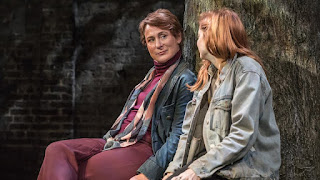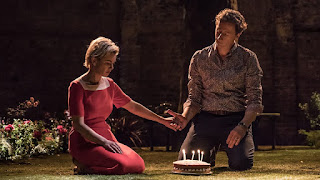When Rupert Goold first took over the Almeida, he launched with a Mike Bartlett play that took inspiration from Shakespeare, to great effect; now they reunite to channel Chekhov. Naming a play Albion in 2017 is a pretty big clue that this is Bartlett's Brexit play, and it takes very little time for the metaphor to reveal itself: It may not be subtle but it's very good. Audrey (Victoria Hamilton) is the self-made owner of a chain of luxury stores where "everything's white, including the customers." On discovering that an Oxfordshire country house where she spent some time as a child is up for sale, she buys it and resettles her family there without asking them. It's not the house so much as the garden she's interested in: Named Albion, it was designed in the 1920s in what was then a revolutionary new style of small, themed gardens, but has fallen into disrepair for decades. Audrey's dream is to recreate the original gardener's vision, even if it alienates first everyone in the village, then everyone she knows.
Miriam Buether has reconfigured the Almeida into a deep thrust to create the realistic setting of The Red Garden, where all the action takes place - so called because it was originally designed as a memorial to the blood spilt in the First World War.
This has significance to her because two years earlier she lost her own soldier son in Afghanistan, and she wants to scatter his ashes there. This causes tensions with his girlfriend Anna (Vinette Robinson,) who now feels she needs to visit the garden every week so she can be close to her dead partner. Audrey still has a daughter, Zara (Charlotte Hope,) who's been uprooted from London against her will. She's also invited her oldest friend Katherine (Helen Schlesinger) to see the garden; a popular novelist, Zara has a crush on her that develops into something more.
I do enjoy a theatrical monster and Bartlett delivers with Audrey - there's no attempt to disguise that she's Brexit: The Person. The original Albion was opened in the 1920s but must have fallen into disrepair almost instantly, as even the oldest residents of the village have no recollection of it being in full bloom. So Audrey is trying to recreate something she's read about but there's no real reason to believe ever actually existed in the way she imagines. She claims to be doing it for the local community but essentiually bans them from ever entering the grounds unless it's to work on them - as Zara makes friends and flirts with assistant gardener Gabriel (Luke Thallon,) her mother can't wait to curtly dismiss him from her presence: Audrey can list any number of reasons why reverting to a society of masters and servants makes good economic sense (with her in the role of master, obviously.)
In fact, the gardens have been central to the community for decades, hosting two festivals every year, but the way they're actually used doesn't gel with Audrey's vision for them, so the events are banished from the grounds, and the locals can benefit from knowing they're there but never being allowed to actually see them (once completed, Audrey is clear that she gets to decide who the right kind of people are to be invited. When she's dead maybe the National Trust will take it, and the villagers can be grateful for the extra custom in the local shops.) Her supreme self-involvement extends to the people she supposedly cares most about - she's known Katherine for 30 years but has taken so little interest in her life she's surprised to find out her friend's writing is popular enough to have devoted fans, who include Gabriel and her own daughter. Hamilton sinks her teeth into this overbearing character and even allows for moments where we can see a human being underneath.
Goold, here working with sound designer Gregory Clarke, seems to have a knack for choosing memorable songs to back his productions and there's three instances here that are very powerful: The four-act structure follows the seasons, and as we transition from winter into spring the cast gradually fill the garden with colour to a soundtrack of Nick Mulvey's "Cucurucu," a scene mirrored when summer turns to autumn with Peter Gabriel's "Here Comes The Flood." In between, to what Andy informs me is Royal Blood, we get an explosive scene where the extent to which Anna's grief borders on mental illness becomes apparent, and she tries to get the earth inside her because it's got her dead lover's remains in it.
Robinson is impressive as this scene later takes on a more literal twist, and Hope gives a lot of depth to Zara, in a cast without weak links - Edyta Budnik stands out in a small role as cleaner Krystyna, a businesswoman after Audrey's own heart, and Nicholas Rowe provides a lot of comic relief as Audrey's louche second husband Paul. Straight out of drama school Thallon is impressive and lovable as the intelligent but trapped Gabriel, plus it's good to see Bartlett stick to one of the most important theatrical rules: When a cute, awkward boy turns up in Act I and gives the impression of muscles rippling under his loose shirt, you have to then give him a shirtless gardening scene in Act III so you can see how buff his arms are. It's called Chekhov's Guns.
It's not perfect - three-and-a-quarter hours is a bit longer than it needs to be, and I think I needed to see more of what exactly about Audrey Paul loves so unreservedly - but it's pretty damn close. And I know I've brought up the Chekhov influence a lot already, but in the same way that Charles III felt like it could withstand numerous different high concepts in the same way real Shakespeare plays do, so too does Albion feel like it could still be around in a hundred years finding new connections with audiences around the world. The topicality means the play's obvious allegory is inescapable now, but I suspect that with distance this will still be a story and set of characters people find a strong connection to. Once again, the Almeida delivers a strong contender to make it into my top ten of the year.
Albion by Mike Bartlett is booking until the 24th of November at the Almeida Theatre.
Running time: 3 hours 15 minutes including interval.
Photo credit: Marc Brenner.







No comments:
Post a Comment